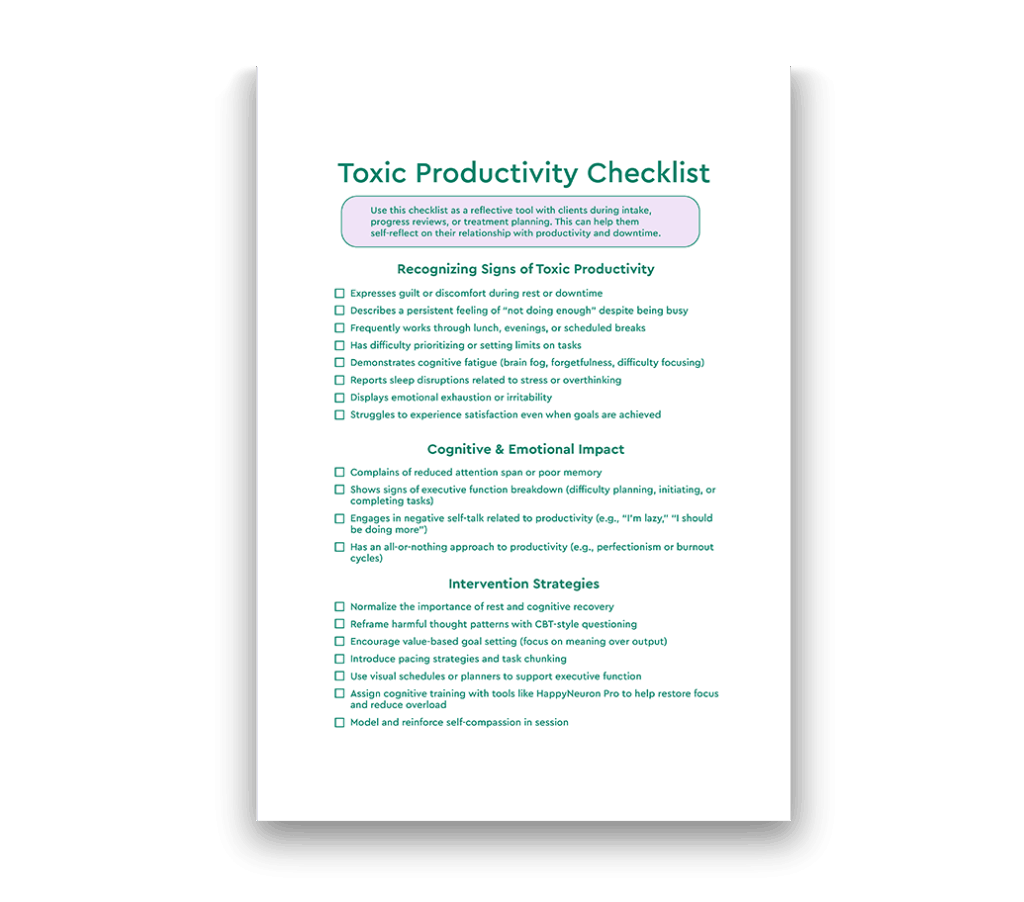Am I Doing Enough? All About Toxic Productivity
In a culture that determines a person’s value based on their performance, many people hear their inner voice asking, “Am I doing enough?” On the surface, this drive for productivity might appear to be motivation. However, it’s often actually anxiety, guilt, and unrealistic expectations that quietly eat away at cognitive well-being. This is called toxic productivity.

What Is Toxic Productivity?
Toxic productivity is the compulsive need to be constantly “doing” in order to feel worthy, successful, or in control. It can manifest as overworking, overscheduling, or feeling guilty during rest—even when rest is necessary and very well-deserved!
Productivity isn’t inherently bad, and of course can be necessary to complete tasks. However, the toxicity lies in the mindset that self-worth is equated with constant output. This belief system can easily lead to persistent burnout, stress, poor emotional regulation, and cognitive fatigue.
This phenomenon is perfectly described in Rupi Kaur’s Poem “Productivity Anxiety,” where she describes feelings of being left behind or not up to par if she is not “optimizing” her time with busy work and checking off goals to get ahead.
For many providers and clients, especially those navigating mental health concerns, injury recovery, or neurodivergence, toxic productivity can become a silent barrier to progress.
The Cognitive and Emotional Toll
Professionals across disciplines know how emotional strain can spill over into cognitive performance. Toxic productivity is no exception. It commonly contributes to:
- Worry and Rumination: Persistent negative thoughts about needing to do more can crowd working memory, making it difficult to focus on the present tasks at hand.
- Brain Fog: Cognitive overload reduces mental clarity and slows processing speed.
- Sleep Disruption: Restless minds lead to restless bodies. Decreased sleep quality can worsen executive functioning and mood.
- Emotional Exhaustion: Overextension often leads to irritability, detachment, or a sense of emotional numbness. This is where burnout in the workplace comes into play, if you are emotionally spent, it is hard to show up for clients’ wants and needs.
Signs of Toxic Productivity
- Inability to relax, or expressing guilt when resting or taking breaks
- Difficulty prioritizing or delegating tasks
- Feeling “lazy” despite being overextended
- A false sense of urgency or inner restlessness
- Diminished satisfaction, even when goals are met
Understanding Productivity Paralysis
When all of these thoughts, feelings, and emotions come to a head, it may lead to a counterintuitive consequence known as productivity paralysis. This happens when the pressure to do everything—and to do it perfectly—becomes so overwhelming that it leads to inaction, resulting in no output at all.
Clients may find themselves staring at a long to-do list but be unable to begin. They may feel stuck, ashamed, or mentally exhausted. From a cognitive perspective, this ‘paralysis’ often stems from overloaded executive functioning systems, where decision-making, task initiation, and planning all begin to break down. Recognizing productivity paralysis as a symptom of burnout, not laziness, is essential for both validation and intervention.
For clinicians and healthcare providers in the field of cognition, it’s essential to reflect on how these patterns manifest not only in our clients but also in ourselves.
Supporting Clients Who Struggle With Toxic Productivity
Toxic productivity is often deeply rooted in complex belief systems shaped by upbringing, culture, or trauma. Here are a few ways we can help clients recognize and shift these patterns:
- Normalize Rest: Educate clients about how rest is a cognitive necessity (not a reward) and how downtime supports attention, memory, and executive function. Guide them in re-examining their relationship with downtime.
- Challenge All-or-Nothing Thinking: Help reframe internal narratives from “I must be productive all the time” to “I’m allowed to take breaks” or “I’m allowed to recharge my mental battery.”
- Promote Value-Based Goals: Encourage clients to identify goals that align with their individual values, rather than societal pressure or external validation.
- Use Cognitive Supports: Tools like task planners, timers, apps or digital platforms can help break tasks into manageable chunks and reduce overwhelm.
- Create an Environment of Calm: Whether a space in your home or even going for a walk, having a place to unplug and detach from to-do lists and expectations can help us feel grounded.
- Practice Self-Regulation Strategies: Deep breathing, journaling, light physical activity or stretching, meditation, listening to calming music, and more. Finding just one strategy that works for each person can help them achieve grounding and presence, and reclaim a more balanced perspective.
Final Thoughts
It’s time to throw the question “Am I doing enough?” in the trash! But in all seriousness, these looming productivity thoughts can quietly drive stress for many people, including those we work with and even ourselves. Recognizing the signs of toxic productivity helps us acknowledge the emotional and cognitive strain behind it. In doing so, we give permission for rest, reflection, and self-compassion, which may be one of the most therapeutic interventions of all!
Use our “Toxic Productivity Checklist” with clients, or on your own to reflect on your relationship with productivity and downtime.










